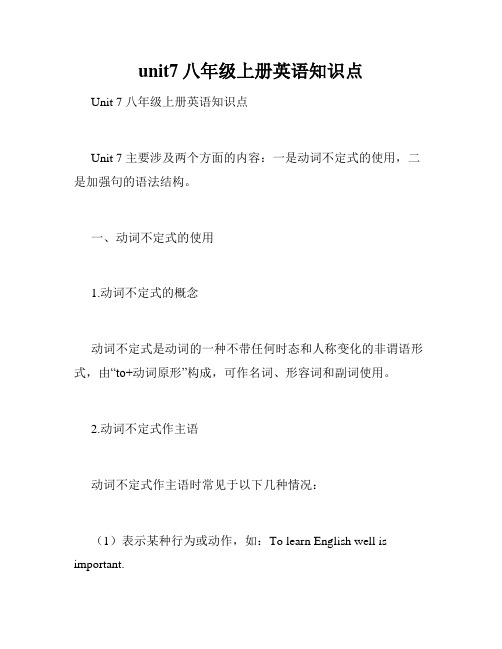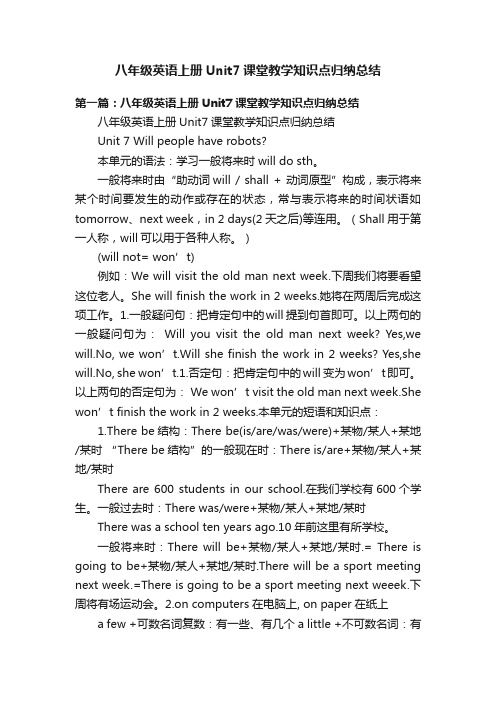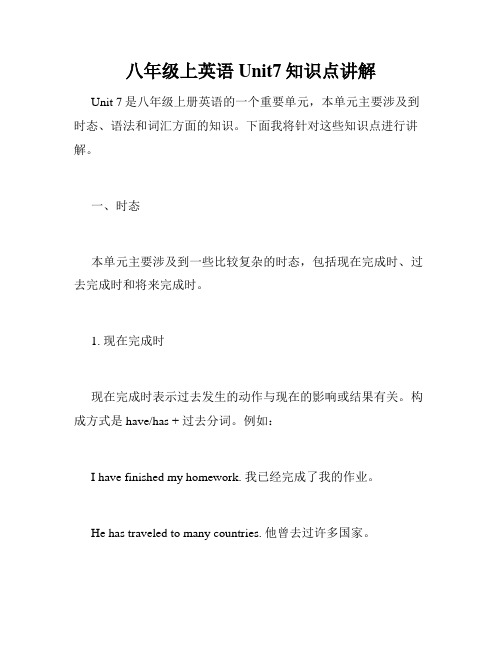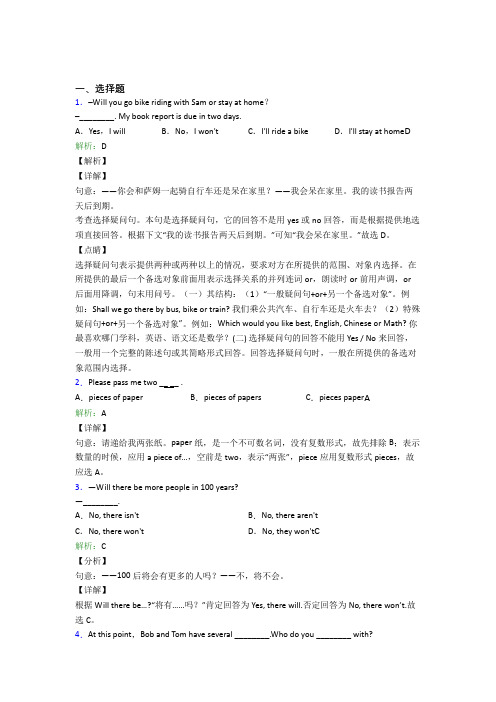广州版八年级英语上册u7_语法归纳
unit7八年级上册知识点

unit7八年级上册知识点八年级上册英语课程中,Unit 7是涉及到大量语法知识和新单词的重要章节。
学生需要熟悉并掌握这些知识点,以便提高他们的英语水平。
接下来,本文将全面介绍Unit 7中的知识点。
一、Unit 7中的基本词汇1. ambition 野心,抱负2. attraction 吸引3. coast 海岸4. disappoint 使失望5. enthusiasm 热情,热心6. exhibition 展览7. greet 欢迎8. occasion 场合9. participant 参与者10. tourist 旅游者二、Unit 7中的语法知识1. 不定冠词不定冠词a和an分别用于单数可数名词前,表示泛指一个人或一个物品。
比如:a book(一本书),an idea(一个想法)等等。
在发音上,a用于辅音开头的单词,an用于元音开头的单词。
2. 物主代词物主代词表达一个人、一个动物或一个事物的所有权或所属关系。
在Unit 7中,我们主要学习了my、your、his、her、its、our和their这七个代词。
比如:This is my camera.(这是我的相机。
)3. 宾格代词宾格代词在句子中做动词的宾语。
Unit 7中我们需要掌握的宾格代词包括me、you、him、her、it、us和them。
比如:Give it to me.(把它给我。
)4. 形容词的比较级和最高级形容词的比较级和最高级分别用于比较两个或两个以上的人或物之间的差异。
比较级的构成为在形容词后加-er,或在形容词前加more。
最高级的构成为在形容词后加-est,或在形容词前加most。
比如:Peter is taller than his sister.(彼得比他的妹妹高。
)5. 一般过去时一般过去时表示过去某个时间发生的动作或状态。
在Unit 7中我们需要掌握一般过去时的构成方式,即对于规则动词而言,过去式通常是动词原形后面加上-ed,而对于不规则动词而言,过去式则不规则变化。
unit7八年级上册英语知识点

unit7八年级上册英语知识点Unit 7 八年级上册英语知识点Unit 7 主要涉及两个方面的内容:一是动词不定式的使用,二是加强句的语法结构。
一、动词不定式的使用1.动词不定式的概念动词不定式是动词的一种不带任何时态和人称变化的非谓语形式,由“to+动词原形”构成,可作名词、形容词和副词使用。
2.动词不定式作主语动词不定式作主语时常见于以下几种情况:(1)表示某种行为或动作,如:To learn English well is important.(2)表示某种需要或缺乏,如:To live without water is impossible.(3)表示一般性的观点或真理,如:To err is human.3.动词不定式作宾语动词不定式作宾语时,常常和动词let, make, have, hear, see等连用,如:(1)He made me take off my shoes.(2)The teacher had the students write a composition.(3)I hope to see you soon.4.动词不定式作表语动词不定式作表语可以用来表示某个状态或抽象概念,如:My duty is to help my parents.5.动词不定式作定语动词不定式作定语主要用来修饰名词或代词,如:I have a lot of work to do.二、加强句的语法结构1.使用并列句并列句是由两个或多个并列成分用并列连词连接起来形成的简单句结构,它们之间没有主谓关系,但具有平行关系,从而能够让句子更加明确、生动。
2.使用复合句复合句是由主句和从句构成的句子结构,通过连接词将两个句子关联起来。
从句既可以作定语、状语、宾语、主语等,使得句子更加丰富多彩。
3.使用倒装句倒装句跟正常语序的句子相比,句子中主语和谓语的位置互换,一般用于强调语气、修辞效果或为了句子平衡。
八年级上册英语语法知识点u7

八年级上册英语语法知识点u7本篇文章将详细介绍八年级上册英语语法的第七个知识点——定语从句。
我们将会讨论定语从句的定义、分类、结构、用法以及注意事项。
一、定语从句的定义定语从句是修饰某个名词或代词的从句,通常用来说明被修饰的名词或代词的具体内容或特点。
比如,“The girl who is standing by the door is my sister.”这句话中的“who is standing by the door”就是一个定语从句,修饰了前面的名词“girl”。
二、定语从句的分类定语从句根据所修饰的名词或代词的不同,可以分为三种类型:1. 关系代词引导的定语从句关系代词是用来连接先行词和定语从句的代词,包括:who, whom, whose, which 和that。
例如:- The book that I borrowed from the library is very interesting.(我从图书馆借的那本书非常有趣。
)- The pen which I lost yesterday was my favorite.(我昨天丢失的那支笔是我最喜欢的。
)- The boy whom I met in the park is my neighbor.(我在公园里遇见的那个男孩是我的邻居。
)- The girl whose bag was stolen in the subway is crying.(那个在地铁里被偷包的女孩在哭。
)2. 关系副词引导的定语从句关系副词是用来连接先行词和定语从句的副词,包括:where, when, why。
例如:- This is the park where we often go for a walk.(这是我们经常去散步的公园。
)- That was the day when he left for America.(那是他去美国的那一天。
八上英语Unit7知识点语法重难点梳理

八上英语Unit7知识点梳理考点一:pollution 不可数n.pollute v.polluted adj.1.Many old people get sick because of serious air (pollute).2.Waste water from chemical factories maybe (pollute) the sea.考点二:hundredtwo hundred具体数字+hundredHundreds of 表示不确切的数目,意为"数百,好几百,成百上千"。
millions of billions of1.Nanjing is a city with many places of interest. Tourists come here every year.A.Thousand ofB.ThousandC.ThousandsD.Thousands of2.---Have you seen the CCTV news on TV?---Yes, children had a good festival on the Children 's Day.A.thousands of,sixtyB.ten thousand;sixtyC.thousands of,sixtiethD.ten thousand,sixtieth1.We plant trees every year. There will be _____________ trees in the future.2.If we waste water,there will be _____________ water.3.If every family has more than a baby,there will be _____________ people.4.There will be more robots everywhere,and humans will have _____________ work to do.5.If there are ______________ cars on the road,there will be less pollution.考点四:in VS after相同点: 这两个词后都可接时间,表示“在……以后”不同点:⒈“in+一段时间”表示以现在为起点的将来一段时间以后,常与将来时连用。
八年级上册英语U7知识点总结

八年级上册英语U7知识点总结Unit 7主题是"The world around us",旨在帮助学生掌握和运用有关自然地理和环境保护的知识,同时追求全面发展学生语言技能。
本单元的学习和探究需要学生运用听、说、读、写四种语言技能,它是一个厚重而宽广的单元,因此,我们需要将知识点进行归纳整理,以方便学生掌握和记忆。
一、重点短语和句型1. be located in:位于例句:Beijing is located in the north of China.2. take a photo/picture:拍照片例句:They took a lot of photos when they traveled to London.3. be famous for:因...而闻名例句:Paris is famous for its Eiffel Tower.4. be famous as:被称为例句:Li Na is famous as a tennis player.5. make a speech:发表演讲例句:The president made a speech at the ceremony.6. be made up of:由...组成例句:The forest is made up of many kinds of trees.7. be divided into:分成...例句:The book is divided into three parts.8. protect the environment:保护环境例句:We should all protect the environment.9. pollute the environment:污染环境例句:Smoking will pollute the air.10. get rid of:摆脱例句:I need to get rid of these old books.11. turn off:关上例句:Please turn off the lights when you leave.12. turn on:打开例句:Can you turn on the TV for me, please?二、重点单词1. earthquake:地震例句:The earthquake destroyed the buildings in the city.2. flood:洪水例句:The flood caused severe damage to the city.3. drought:干旱例句:The drought made it difficult for farmers to grow crops.4. hurricane:飓风例句:The hurricane destroyed many houses in the area.5. pollution:污染例句:The pollution in the river is getting worse.6. environment:环境例句:We need to protect the environment for future generations.7. recycle:回收利用例句:We should recycle more to reduce waste.8. energy:能源例句:Solar energy is a clean source of energy.9. population:人口例句:The population of the city is growing rapidly.10. global warming:全球变暖例句:We need to take action to reduce global warming.三、重要语法点1. 现在进行时的用法现在进行时表示正在进行的动作。
八年级上册英语Unit7考点汇总

八年级上册英语Unit7考点汇总Unit7 Will people have robots?【重点词语/短语用法解析】1. many+可数名词许多......much +不可数名词许多......2. live to be+基数词+ years old“活到...…岁”3. be in great danger 处在极大的危险中4. play a part in +名/代/V-ing. 参与某事/做某事Everyone should play a part in saving the earth.5. help (sb.) with sth. 帮助(某人)做某事He often helps me with my English.help sb. (to) do sth. 帮助(某人)做……He often helps me study English.help oneself ( to ) 自用(食物等)Help yourself to the fish. 请随便吃鱼6. the same as…和……一样...... 反义短语:be different from7. It takes/took/will take sb. some time to do sth. 某人花了……时间做某事(时态根据具体情况决定)It takes me an hour to get to my office.spend time/money on sth. 在……上花费时间(金钱)sb. spend time/money (in) doing sth. 花费时间(金钱)做某事。
I spent two hours on this math problem. 这道数学题花了我个小时。
They spent two years building this bridge. 造这座桥花了他们两年时间。
8. hundreds of+ 名词复数许多/大量......数词+hundred + 名词复数几百......类似的数词还有thousand(千), million(万)There are four hundred students in our grade.There are hundreds of tourists in Beijing every year.9. during 在…期间during the vacation/the daytime/the weekend10. the meaning of …...的意思Can you tell me the meaning of the words?。
八年级英语上册Unit7课堂教学知识点归纳总结

八年级英语上册Unit7课堂教学知识点归纳总结第一篇:八年级英语上册Unit7课堂教学知识点归纳总结八年级英语上册Unit7课堂教学知识点归纳总结Unit 7 Will people have robots?本单元的语法:学习一般将来时will do sth。
一般将来时由“助动词will / shall + 动词原型”构成,表示将来某个时间要发生的动作或存在的状态,常与表示将来的时间状语如tomorrow、next week,in 2 days(2天之后)等连用。
(Shall用于第一人称,will可以用于各种人称。
)(will not= won’t)例如:We will visit the old man next week.下周我们将要看望这位老人。
She will finish the work in 2 weeks.她将在两周后完成这项工作。
1.一般疑问句:把肯定句中的will 提到句首即可。
以上两句的一般疑问句为:Will you visit the old man next week? Yes,we will.No, we won’t.Will she finish the work in 2 weeks? Yes,she will.No, she won’t.1.否定句:把肯定句中的will 变为won’t即可。
以上两句的否定句为:We won’t visit the old man next week.She won’t finish the work in 2 weeks.本单元的短语和知识点:1.There be结构:There be(is/are/was/were)+某物/某人+某地/某时“There be结构”的一般现在时:There is/are+某物/某人+某地/某时There are 600 students in our school.在我们学校有600个学生。
一般过去时:There was/were+某物/某人+某地/某时There was a school ten years ago.10年前这里有所学校。
八年级上册U7知识点

Unit 7 Will people have robots?1 重点单词用法1. paper n. 不可数名词,纸,纸张。
a piece of paper 一张纸two pieces of paper 两张纸2.pollution n. 不可数名词,污染,污染物。
v. pollute , 污染,弄脏adj. polluted 受污染的air pollution 空气污染, noise pollution 噪音污染3.environment n. 环境,指自然环境时,常在其前加定冠词the.It’s our duty to protect the environment .4 play a part in 参与...., 在....中发挥作用play a part in +名词/代词/动词ing5 space n. 不可数名词,太空,空间与space相关的词汇 spaceman 宇航员, spaceship 宇宙飞船space station 太空站。
6.human adj. 人的 n. 人human & person & people & manHe was the only human on the island.There are only three persons in the room.There are many people there.Man is stronger than woman.7. believe vt. 相信,认为有可能。
believe+名词/代词/that 从句。
You can’t believe anything she says.believe sb 相信某人(所说的话是真的)believe in sb 信任某人I believe him, but I can’t believe in him.8 .disagree vi. 不同意,持不同意见,分歧反义词 agreedisagree with sb 与某人持不同意见agree with sb 同意某人意见9 even adv. 甚至,连,愈加,通常置于所修饰词之前,若有助动词,则置于助动词之后,在句中加强语气。
八年级英语上册Unit 7语法知识梳理

八年级英语上册Unit 7语法知识梳理Will people have robots?本单元语法重点:一般将来时。
一般将来时表示将来某一时刻的动作或状态,或将来某一段时间内经常的动作或状态。
除了“be going to”结构外,还有另一种表达方式,即“will + 动词原形”。
常常和表示将来的时间状语连用,如 tomorrow,next week,in + 时间,in the future 等。
一、陈述句肯定句:主语+will+动词原形 + 其他。
例如:He will go back to London in five days.否定句:主语 + won't (will not) + 动词原形 + 其他。
例如:It won't (will not) be sunny tomorrow.二、一般疑问句Will+主语+动词原形+其他?肯定回答:Yes, 主语+will.否定回答:No, 主语+won't.例如:— Will she come to the party this evening?— Yes, she will. / No, she won't.三、特殊疑问句特殊疑问词 + will + 主语 + 动词原形 + 其他?例如:When will you get up tomorrow morning?【记忆口诀】将来事情未发生,“打算”“将”“要”句意中。
判断时态要仔细,将来时间要看清。
be going to 和 will,后面都要跟原形will 不分人称、数,be going to 则不同。
be 要跟着主语变,它的用法记分明“单三”is,“我”am,其余主语 are 就行。
Will,be 后加 not,句子变会变否定Will, be 到时句子前,一般问句即变成。
回答形式更简单,相信大家一定行。
初中英语八上 Unit7语法知识点总结

Unit7Section ADo you think.....宾语从句及其做插入语的用法There be句型的一般现在时肯定否定回答以及反义疑问句的结构live to be+年龄=live to+年龄=live to the age of....活到...岁在....之后:in+一段时间(将来时);after+时间点(过去和将来时);段时间+later(过去和将来时)提问:how soon——in+段时间how long——for+段时间when——aftereverything 作主语V用单数;形容词修饰时形容词需要后置;与否定词连用表示部分否定。
free免费的有空的空闲的反义:busy原级比较级最高级many/much more mostlittle less leastfew fewer fewestfuture n. 将来未来in the future 在将来in future =from now on 从今以后,今后,往后enviromental 环境enviromental 环境的danger 危险in danger 在危险之中in great danger处于极度危险之中反义:out of danger 脱离危险on the earth 在地球上on earth 究竟me too=me,too=so do I 我也是play a part in 参与.....;在......中起作用;扮演.....角色+名词,代词或动名词做宾语。
I hope so我也希望如此I hope not 我希望不是这样Section BAcross prep./adv. 穿过,横穿,在什么对面(从一边横穿到另外一边)Across from 在....对面= on the other side ofThe shoe store is across from the bank.Walk/go/run/swim 等+across =cross ,与street,bridge,river等连用。
广州版英语八年级第一学期课堂笔记U7Grammar

Unit 7 Grammar: If & unless
引导条件状语从句最常用的连词是if和unless
1.If的用法
(1) if意为“如果”,引导条件状语从句可以放在主句之前,也可以放在主句之后。
但是放在主句之前,常用逗号与主句分开。
E.g. If you get up early, you will not be late for school.
=You will not be late for school if you get up early.
(2)当谈论未来可能出现的情况时,主句用一般将来时,if从句用一般现在时,“主将从现”。
E.g. If I am free, I will come to see you .
(3)表示在某种条件下必然发生或是客观事实和结果的时候,if从句用一般现在时,主句也用一般现在时,即“主现从现”。
E.g. If you heat ice, it turns into water.
2.if...not和unless的关系
unless 意为“除非,如果不”,=if…not,引导的条件状语从句和if的用法一样。
(1)I will plant the flowers if it does n’t rain tomorrow.
= I will plant the flowers unless it rains tomorrow.
(2)If you do n’t study hard, you will not pass the exam.
=Unless you study hard, you will not pass the exam.。
八年级上unit7知识点总结

八年级上unit7知识点总结本单元主要学习了英语中的动词时态,包括一般现在时、一般过去时、一般将来时等,也学习了一些词语的用法,比如wish、hope、be going to等。
本篇文章将对此次学习内容进行总结。
一、动词时态1. 一般现在时一般现在时表示经常性的、习惯性的动作或者真理。
主语+动词(原形)+其他(如:she often reads books.)2. 一般过去时一般过去时表示过去的时间或者过去的经历。
主语+动词(过去式)+其他(如:I went to the park yesterday.)3. 一般将来时一般将来时表示将来会发生的事情。
主语+will+动词(原形)+其他(如:I will go to Beijing next month.)4. 现在进行时现在进行时表示现在正在发生的动作,或者未来已经安排好的计划。
主语+be+动词(现在分词)+其他(如:I am studying for the exam now.)5. 过去进行时过去进行时表示在过去某一时刻正在发生的动作。
主语+was/were+动词(现在分词)+其他(如:She was sleeping when he arrived.)二、词语的用法1. wishwish后面接“从句”,表示对现在或者将来情况的希望。
如:I wish I were a bird.2. hopehope 后面接“that从句”或者“从句”。
如:I hope that I can pass the exam.3. be going tobe going to 表示按照计划、打算要做什么事情。
如:I am going to have a big meal tonight.4. much、many、a lot ofmuch、many、a lot of都表示数量,不同之处在于much、many用于不可数名词以及可数名词的复数形式,而a lot of只用于肯定句中,不适用于疑问句和否定句。
八年级上英语Unit7知识点讲解

八年级上英语Unit7知识点讲解Unit 7是八年级上册英语的一个重要单元,本单元主要涉及到时态、语法和词汇方面的知识。
下面我将针对这些知识点进行讲解。
一、时态本单元主要涉及到一些比较复杂的时态,包括现在完成时、过去完成时和将来完成时。
1. 现在完成时现在完成时表示过去发生的动作与现在的影响或结果有关。
构成方式是have/has + 过去分词。
例如:I have finished my homework. 我已经完成了我的作业。
He has traveled to many countries. 他曾去过许多国家。
2. 过去完成时过去完成时表示过去的过去,一般用于先后发生的两个动作中,先发生的动作使用过去完成时。
构成方式是had + 过去分词。
例如:By the time I got there, they had already left. 我到那儿的时候,他们已经离开了。
She had finished the project before the deadline. 她在截止日期之前已经完成了这个项目。
3. 将来完成时将来完成时表示将来某一时间之前已经完成的动作。
构成方式是will have + 过去分词。
例如:By next year, he will have graduated from college. 到明年,他就会从大学毕业了。
We will have finished our work by lunchtime. 中午之前我们就会完成我们的工作了。
二、语法本单元主要涉及到被动语态和虚拟语气。
1. 被动语态被动语态表示动作的承受者,即谓语动词的动作被施加在主语身上。
被动语态一般由be + 过去分词构成。
例如:The book was written by him. 这本书是他写的。
The meeting will be held next week. 下周会议将会召开。
2. 虚拟语气虚拟语气表示非现实情况下所说的语气,常用于条件句、愿望句和建议句中。
八上英语第七单元知识点总结

八上英语第七单元知识点总结摘要:一、前言二、单元学习重点1.词汇2.语法3.句型三、知识点详解1.词汇2.语法3.句型四、学习建议1.巩固词汇2.加强语法练习3.创设语境进行对话练习五、总结正文:【前言】八年级上学期的英语学习已经进入了第七单元,本单元的知识点内容丰富,涉及多个方面。
为了帮助大家更好地掌握本单元的知识点,本文将对第七单元进行知识点总结。
【单元学习重点】1.词汇本单元的词汇包括一些表示颜色、形状、大小等特征的形容词,以及一些常用的疑问词。
掌握这些词汇有助于丰富我们的表达能力。
2.语法本单元的语法主要是现在进行时态的用法。
现在进行时态表示正在进行的动作或存在的状态,对于描述当前正在发生的事情非常有用。
3.句型本单元的句型主要包括一般疑问句、特殊疑问句和祈使句。
掌握这些句型有助于我们进行日常交流。
【知识点详解】1.词汇(1)颜色:red(红色)、yellow(黄色)、blue(蓝色)、green(绿色)(2)形状:round(圆形的)、square(方形的)、triangle(三角形的)(3)大小:big(大的)、small(小的)、long(长的)、short(短的)(4)疑问词:where(在哪里)、when(什么时候)、what(什么)、who(谁)2.语法现在进行时态的构成:主语+ be动词(am/is/are)+ 动词ing + 其他成分例如:I am studying English.(我正在学习英语。
)3.句型(1)一般疑问句:Be动词(am/is/are)+ 主语+ 动词ing + 其他成分+ ?例如:Are you listening to me?(你在听我说话吗?)(2)特殊疑问句:疑问词+ be动词(am/is/are)+ 主语+ 动词ing + 其他成分+?例如:What are you doing here?(你在这里做什么?)(3)祈使句:动词原形+ 其他成分例如:Open the door, please.(请打开门。
八年级上册unit7英语知识点

八年级上册unit7英语知识点本文主要介绍八年级上册英语unit7的相关知识点,包括语法、词汇和常用表达方式。
一、语法在unit7中,我们学习了一些重要的语法知识点。
其中包括:1. 现在进行时现在进行时表示现在(说话瞬间)正在进行的动作。
构成方式:主语+am/is/are+现在分词。
例如:She is listening to music.(她正在听音乐。
)2. 一般将来时一般将来时表示将来某个时间会发生的动作。
构成方式:主语+will+动词原形。
例如:I will go to Beijing tomorrow.(我明天会去北京。
)3. 一般过去时一般过去时表示过去某个时间发生的动作。
构成方式:主语+动词过去式。
例如:He lived in Shanghai last year.(他去年住在上海。
)二、词汇在unit7中,我们学习了一些常用词汇。
以下是一些重要的词汇:1. beach [biːtʃ] n.沙滩2. island ['aɪlənd] n.岛屿3. mountain ['maʊntən] n.山4. swim [swɪm] v.游泳5. surf [sɜːf] n.冲浪6. camp [kæmp] v.露营7. picnic ['pɪknɪk] n.野餐8. hiking ['haɪkɪŋ] n.徒步旅行三、常用表达方式1. 向某人提出建议Would you like to go to the beach with me this weekend?(你是否想和我一起去海滩度周末?)2. 表达喜爱之情I really love hiking in the mountains.(我非常喜欢在山里徒步旅行。
)3. 表达不喜欢之情I don't like swimming in the sea.(我不喜欢在海里游泳。
)4. 描述地点The beach is a great place to relax.(沙滩是一个放松的好地方。
广州市初中英语八年级上册 Unit 7知识点总结(专题培优)

一、选择题1.─Will you go bike riding with Sam or stay at home?─________. My book report is due in two days.A.Yes,I will B.No,I won't C.I'll ride a bike D.I'll stay at home D 解析:D【解析】【详解】句意:——你会和萨姆一起骑自行车还是呆在家里?——我会呆在家里。
我的读书报告两天后到期。
考查选择疑问句。
本句是选择疑问句,它的回答不是用yes或no回答,而是根据提供地选项直接回答。
根据下文“我的读书报告两天后到期。
”可知“我会呆在家里。
”故选D。
【点睛】选择疑问句表示提供两种或两种以上的情况,要求对方在所提供的范围、对象内选择。
在所提供的最后一个备选对象前面用表示选择关系的并列连词or,朗读时or前用声调,or 后面用降调,句末用问号。
(一)其结构:(1)“一般疑问句+or+另一个备选对象”。
例如:Shall we go there by bus, bike or train? 我们乘公共汽车、自行车还是火车去?(2)特殊疑问句+or+另一个备选对象”。
例如:Which would you like best, English, Chinese or Math? 你最喜欢哪门学科,英语、语文还是数学?(二) 选择疑问句的回答不能用Yes / No来回答,一般用一个完整的陈述句或其简略形式回答。
回答选择疑问句时,一般在所提供的备选对象范围内选择。
2.Please pass me two __ __ .A.pieces of paper B.pieces of papers C.pieces paper A解析:A【详解】句意:请递给我两张纸。
paper纸,是一个不可数名词,没有复数形式,故先排除B;表示数量的时候,应用a piece of…,空前是two,表示“两张”,piece应用复数形式pieces,故应选A。
广州版英语八年级第一学期课堂笔记U7 More practice

U7 More practice1. It is important to exercise your brain.It is + adj. + to do sth. exercise在这里是V.意为“锻炼”E.g. 对孩子们来说,穿过繁忙的街道很危险。
It is dangerous for children to cross the busy street.2. … you will keep your brain active.①keep … adj. 保持某种状态②keep … doing 持续做某事(1)她让宝宝安静。
She tried to keep the baby quiet.(2)这孩子老是问我问题。
This child kept asking me questions.(3)他让我等了半个小时。
He kept me waiting for half an hour. 3. You must give your brain enough time.记住:enough money ; good enough★ enough +n. ; adj+enoughE.g. 足够的钱、睡眠、书:enough money/sleep/books够大、够便宜、够富裕:big/cheap/rich enough ★ … enough … to do sth.(1)我已经长大了,可以照顾自己了。
I am old enough to take car of myself.(2)她够钱买那部电脑了。
She has enough money to buy that computer.4. … to improve your memory, you should exercise your brain …★ to do sth.动词不定式表示目的,意为“为了”。
1)为了提高英语,我们应该多做练习。
To improve English, we should do more exercise.2)他打开窗,好让新鲜空气进来。
广州版英语八年级第一学期课堂笔记U7 Reading

Dec.21st Unit 7 Reading1. A great way to help you remember something is to imagine apictureof it in you mind.①A +adj way to do sth. is to do sth.一个做某事的…的办法是…E.g. 一个容易交友的办法就是对他人微笑。
An easy way to make friends is to smile at others.②way和method均意为“方法、办法”,但有区别:way是一个普通用词,着重个人的或具体的方式或方法,如:ina(n) ...way “用...的方法/方式”;method 强调系统地、有条理地办事或解决问题的方法。
E.g. 她友好地笑了笑。
She smiled in a friendly way.刘老师用了一种新的教学法。
Miss Liu used a new teaching method.2. This makes it the longest word in the world.这使它成为世界上最长的单词。
make sb./sth. + n. “使某人/某物成为...”make sth./ sb. +adj. “使某物/某人怎么样”make sb. do sth. “使某人做某事”(make是使役V.+动词原形)E.g. 这部电影使他成为了一名明星。
This film made him become a superstar.她每天都使朋友们开心。
She makes her friends happy every day.3....remember something is to imagine a picture of it in your mind.①imagine “想象”,动词;imagination名词,“想象力”②imagine doing sth. 想做某事;in sb’s mind “在某人脑海中/心中”E.g. 她无法想象住在那样一个地方。
- 1、下载文档前请自行甄别文档内容的完整性,平台不提供额外的编辑、内容补充、找答案等附加服务。
- 2、"仅部分预览"的文档,不可在线预览部分如存在完整性等问题,可反馈申请退款(可完整预览的文档不适用该条件!)。
- 3、如文档侵犯您的权益,请联系客服反馈,我们会尽快为您处理(人工客服工作时间:9:00-18:30)。
U7 复习一、短语
1.be in danger 处于危险中
2.environmental problems 环境问题
3.the greenhouse effect温室效应
4. a kind of一种;某种
5.act like 行为举止像;表现得像
6.let … in/out 使…进入/出去
7.keep/stop/prevent sb/sth from doing sth.
阻止某人/某物做…
8.in the form of…以……的形式
9.keep in…保留……
10.cause something to do something 引
起…做某事
11.take in 吸收
12.hold sb/sth together 使…结合在一起;
使…团结
13.mountains of 堆积如山的,大量的
14.in one’s +整十的数词复数在某人几十
多岁的时候
15.throw…away把……扔掉
16.in order to do sth 目的是;为了做某事
17.imagine doing sth. 想象做某事
18.answer to…什么的答案
19.give up (doing) sth. 放弃
20.get/ go back to 回到…, 回归…
21.have a bright future 有一个美好的未来
22.get/ have sth. done. 让…完成/做23.not … until 直到…才(主将从现)
24.as soon as possible 尽快
25.pay a fine of… 赔一笔……的罚款
26.go to prison 坐牢
27.prefer (doing.) sth. / prefer to do. sth.宁
愿做某事
28.instead of 代替
29.the Whites怀特一家
30.be the same as 与…一样
31.be different from 与…不同
32.wa rm … up 热身,使…活跃起来
33.give a reason 说明原因
34.know of... 知道…; 熟悉…
35.Environmental Protection Bureau环保局
36.waste materials废料
37. a building site 建筑工地
rm sb. of / about sth. 通知某人关
于…
39.take actions 采取行动
40.deal with 处理
41.put out 熄灭;扑灭
42.be good/bad for对……有好处/坏处
43.thousands of数千的;成千上万的
44.take/have a holiday 度假
45.as you know正如你所知道的
二、词汇
1.consume (n.) consumer
2.dangerous (n.) danger
3.environment (adj./adv.) environmental
environmentally
4.imagination (v.) imagine
5.warm (n.) warmth
6.hot (n.) heat
7.importance (adj.) important
8.life (adj.) lifeless
9.pollute (n.) pollution
10.harm (adj.) harmless/harmful
11.friend (adj.) friendly
12.breath (v.) breathe
13.recent (adv.) recently
14.wealth (adj.) wealthy 15.health (adj.) healthy
e (adj.) useful/useless
17.reduce (n.) reduction
18.produce (n.) product
19.improve (n.)improvement
20.science (n.) scientist
21.difference (adj.) different
22.neighbour (n.) neighbourhood
23.prefer (n.) preference
24.direct (n.) director
rmation (v.) inform
26.act (n.) action
27.tour (n.) tourist
28.protect (n.) protection
29.chemistry (n./adj.) chemical
三、语法
1. much too, too much, too many
2. reach, arrive in/at, get to
3. prefer 的用法
prefer A to B = like A better than B
prefer doing sth. to doing sth= prefer to do sth. rather than do sth.
eg. Mary likes swimming better than skating.
= Mary prefers swimming to skating.
= Mary prefers to swim rather than skate.
4. why & because
1)疑问词why用于询问原因,回答时用because引导。
2)because(因为)与so (所以)不能同时使用
3)because +从句;because of +名词/代词/动词ing形式
✧since(由于, 既然) 和for(因为,表推测) 也可以引导原因状语从句
Since everyone is here, le t’s start.
既然大家都到了,我们就开始吧
It must have rained last night, for the ground is wet.
昨晚一定是下了雨,因为地面是湿的。
5. a s…as…
1) as+形容词/副词原级+as …和…一样怎样
eg. My parcel is as heavy as yours. 我的包裹和你的一样沉。
2) not as/so+形容词/副词原级+as 不如……
eg. He doesn’t calculate as accur ately as a calculator. 他计算不如计算器精确。
✧同级比较与比较级的转换
Tom is not as careful as Mary. 汤姆不如玛丽认真。
=Tom is less careful than Mary.
3) 倍数+ as+ adj.+ as
eg. Asia is four times as large as Europe. 亚洲有欧洲的四倍大
= Asia is three times larger than Europe. 亚洲比欧洲大三倍。
4)as much+不可数名词+as as many+复数可数名词+as
eg. He has learned as many English words as his brother (has).
他已学了和他哥哥一样多的英文单词。
My little daughter ate as much food as her sister.
我的小女儿和她姐姐吃一样多的食物。
6. as, like, the same as & different from & be similar to
as正如,强调一模一样like 像…,强调某些方面相似
like(v.)—(opp.)dislike like(prep.)—(opp.)unlike
the same as完全相同different from不同,不相象be similar to和…相似的三者常与连系动词be, feel, look, seem, smell, sound, taste连用。
